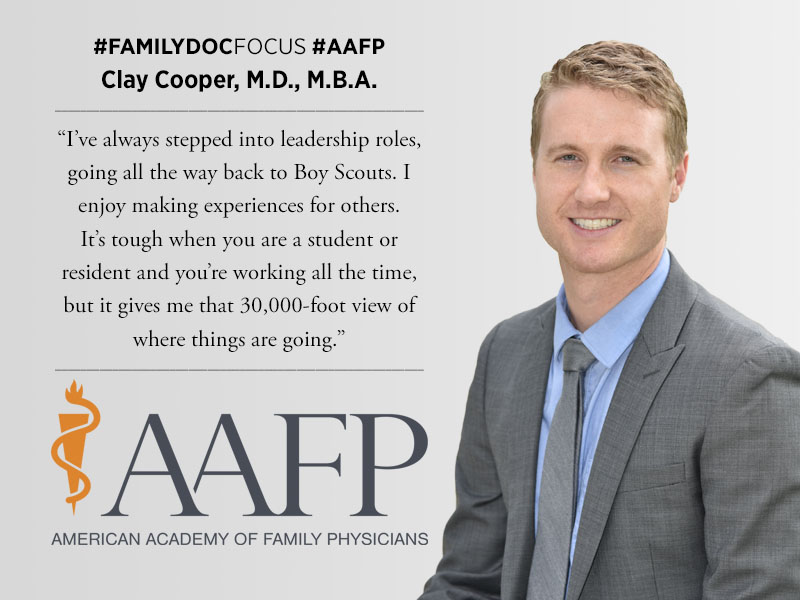Duke Resident Is Eager to Lead
October 12, 2020, 9:15 am David Mitchell – During his third year at the Penn State College of Medicine, Clay Cooper, M.D., M.B.A., founded and co-directed a student-run free clinic in a small, underserved community. Four years later, the clinic not only is still serving Tyrone, Pa., it has expanded its services and hours of operation.

It turns out that just getting the clinic’s doors open was one of the most challenging tasks, and Cooper realized he needed to know more about the financial side of medicine.
“I was working on a grant application for the clinic, and I was sitting there Googling financial terms,” said Cooper, a third-year resident at the Duke Family Medicine Residency Program in Durham, N.C. “I knew it wouldn’t be my last grant application because I want to work with underserved populations. Health care in this country is run as a business, and I wanted to understand that mentality. I don’t plan to open a practice, but I do see myself in leadership roles and I want to be able to influence the system around me.”
Cooper split his fourth and fifth years at Penn State between medical school and business school so that he also could earn a master’s in business administration. It didn’t take long for him to apply his business education to health care. During his intern year at Duke, he was the first-year representative to the residency program’s curriculum committee.
The program was not maximizing its 4-to-1 resident-to-preceptor cap, so Cooper created a new scheduling system that balanced the number of residents in clinic and increased efficiency. The change, he said, increased clinic revenue generated by residents by about $200,000. That additional revenue proved important during the unexpected financial hardship caused by COVID-19.
The change also improved resident satisfaction.
“You learn more with other residents because you can talk things through,” said Cooper, one of 16 residents recently honored with the AAFP Award for Excellence in Graduate Medical Education. “It’s a better learning environment.”
The curriculum committee wasn’t the only example of Cooper hitting the ground running at Duke. During his intern year, he also was named a World Health Organization young leader and attended the WHO/UNICEF Global Conference on Primary Health Care in Astana, Kazakhstan.
A year later, Cooper found himself presenting on topics related to that WHO meeting alongside (then) Duke program director Viviana Martinez Bianchi, M.D., a member of the Wonca executive committee, at the Wonca World Rural Health Conference in Albuquerque, N.M.
“Her network is immense,” Cooper said, “and I’m glad to now have friends and colleagues around the world I met through her.”
Cooper and Martinez Bianchi met in 2013 when the (then) first-year medical student was making a presentation on health disparities in Latino populations at the 2013 AAFP Global Health Workshop in Baltimore.
“She came to my talk,” Cooper said. “She’s been my mentor ever since.”
Cooper continues to seek leadership opportunities. He is wrapping up his term on the AAFP’s Commission on Membership and Member Services, and he also is the resident member of the North Carolina AFP’s Board of Directors.
And remember that student-run clinic? That was Cooper’s project during his time in the AAFP Foundation’s Family Medicine Leads Emerging Leader Institute. He later served as an ambassador for that program and as student member of the Foundation’s Board of Trustees.
“I’ve always stepped into leadership roles, going all the way back to Boy Scouts,” he said. “I enjoy making experiences for others. It’s tough when you are a student or resident and you’re working all the time, but it gives me that 30,000-foot view of where things are going.”
Cooper already knows where he’s going next — home. After graduating in June, he’s taking a position with Geisinger Health System in rural Pennsylvania. He intends to stay on a leadership path, advocating for his specialty and patients.
“It’s worth it to take half a day or a day and go to a rally, pick up the phone or email your elected representatives,” he said. “I want to use my knowledge and expertise to be a trusted source for health care issues.”